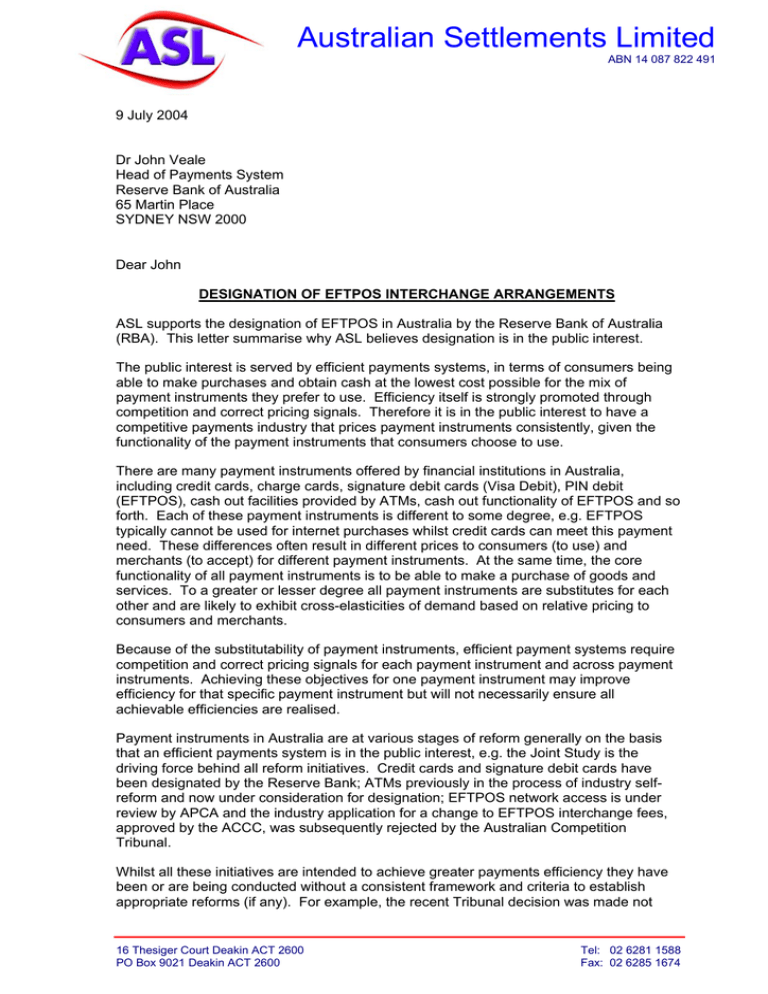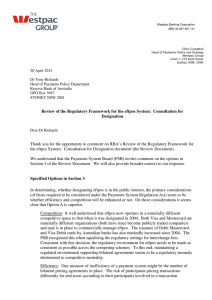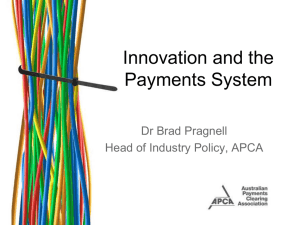Australian Settlements Limited
advertisement

Australian Settlements Limited ABN 14 087 822 491 9 July 2004 Dr John Veale Head of Payments System Reserve Bank of Australia 65 Martin Place SYDNEY NSW 2000 Dear John DESIGNATION OF EFTPOS INTERCHANGE ARRANGEMENTS ASL supports the designation of EFTPOS in Australia by the Reserve Bank of Australia (RBA). This letter summarise why ASL believes designation is in the public interest. The public interest is served by efficient payments systems, in terms of consumers being able to make purchases and obtain cash at the lowest cost possible for the mix of payment instruments they prefer to use. Efficiency itself is strongly promoted through competition and correct pricing signals. Therefore it is in the public interest to have a competitive payments industry that prices payment instruments consistently, given the functionality of the payment instruments that consumers choose to use. There are many payment instruments offered by financial institutions in Australia, including credit cards, charge cards, signature debit cards (Visa Debit), PIN debit (EFTPOS), cash out facilities provided by ATMs, cash out functionality of EFTPOS and so forth. Each of these payment instruments is different to some degree, e.g. EFTPOS typically cannot be used for internet purchases whilst credit cards can meet this payment need. These differences often result in different prices to consumers (to use) and merchants (to accept) for different payment instruments. At the same time, the core functionality of all payment instruments is to be able to make a purchase of goods and services. To a greater or lesser degree all payment instruments are substitutes for each other and are likely to exhibit cross-elasticities of demand based on relative pricing to consumers and merchants. Because of the substitutability of payment instruments, efficient payment systems require competition and correct pricing signals for each payment instrument and across payment instruments. Achieving these objectives for one payment instrument may improve efficiency for that specific payment instrument but will not necessarily ensure all achievable efficiencies are realised. Payment instruments in Australia are at various stages of reform generally on the basis that an efficient payments system is in the public interest, e.g. the Joint Study is the driving force behind all reform initiatives. Credit cards and signature debit cards have been designated by the Reserve Bank; ATMs previously in the process of industry selfreform and now under consideration for designation; EFTPOS network access is under review by APCA and the industry application for a change to EFTPOS interchange fees, approved by the ACCC, was subsequently rejected by the Australian Competition Tribunal. Whilst all these initiatives are intended to achieve greater payments efficiency they have been or are being conducted without a consistent framework and criteria to establish appropriate reforms (if any). For example, the recent Tribunal decision was made not 16 Thesiger Court Deakin ACT 2600 PO Box 9021 Deakin ACT 2600 Tel: 02 6281 1588 Fax: 02 6285 1674 2 because a public benefit does not exist but because the public benefit could not be established to the satisfaction of the Tribunal. This result is not surprising given that historic costs and investments are not available within which to assess current commercial arrangements and future benefits require a priori quantification of market place reactions to change. In addition, a number of apparently conflicting views on specific issues have arisen during various reform processes. For example: • Why are credit card interchange fees based on cost but the proposed interchange fee for EFTPOS does not appear to be cost based? • Merchants indicated negative interchange fees are required to provide the ability for funds to flow to them to support and expand their part of the EFTPOS network. Their part of the network also is used to process significant volumes of credit transactions. Why were merchants not as adamant about this issue during credit card reform? • Are there instances in which an interchange fee is more commercially practicable than direct charges for ATM transaction and under what circumstances? • Why does Australia have a high degree of EFTPOS terminal penetration but a relatively low number of transactions per terminal compared to other markets? • Why is the Australian /NZ market the only countries that currently have a reverse flow of interchange fees for PIN based debit (EFTPOS) transactions These issues and others can be assessed in a framework for payments system reform based on sound conceptual and practicable economics, consistently applied and buttressed to the degree possibly by quantified evidence. However, lack of difficult-toobtain data should not preclude changes that are consistent with the framework established. It is in the public interest to have in place sound and consistent frameworks for all relevant payment instruments even if the results can only be directionally assessed but not accurately quantified. It is in the public interest to achieve greater competition, provide improved relative pricing signals, and realise efficiencies even if the magnitude of those benefits is difficult or impossible to quantify to the satisfaction of all parties. Reforms to date, whether in effect or planned, are being pursued in various venues and there is no assurance that, when taken together, they will produce a consistent result. It is possible that the net result, as represented by the sum of the parts, will not achieve the magnitude of benefits possible or that the net impact on some parties will be unnecessarily and adversely impacted to the benefit of other parties. This is certainly not in the public interest. Credit cards, debit cards and ATMS all have a significant four party aspect to them and the need to establish appropriate commercial arrangements to ensure scales economies are reached and maintained. It is typically the preference of the private sector and regulatory bodies to allow competitive market forces to establish those arrangements wherever possible. However, the RBA in its Joint Study and subsequent material such as the Credit Card Consultation Document indicated that the RBA had some reservations in regard to whether current arrangements in several aspects of credit cards, debit cards and ATMs where logical, provided correct pricing signals, and promoted efficiency in the Australian payments system. The RBA subsequently designated the domestic credit card network and implemented reforms in the areas of interchange fees, surcharging, and scheme access. These reforms were developed within the context of the Payment Systems Board’s mandate to promote efficiency and competition in the Australian payments system, consistent with overall financial stability. From this mandate, the RBA developed a number of guiding principles in respect to payments systems such as: 3 • Prices charged to consumers by financial institutions should reflect costs and demand conditions • Merchants should be free to set prices that promote competition • Prices of payment instruments should be transparent • Entry restrictions should be the minimum necessary for the safe operation of the system • Open and effective competition within the market for a payment instrument and between payment instruments. Within these principles the RBA developed specific guidelines in such areas such as the determination of interchange costs and fees, surcharging and access as they pertain to four party domestic credit cards. Thus there exists a framework for reviewing the degree to which payments systems in general, and four-party payments systems in particular, individually and collectively support the objective of efficiency. It is in the public interest for this framework to be consistently applied across all relevant payment instruments. Ideally efficiency would be achieved by market forces and competition operating within the payments services industry structure. However, ASL does not believe that existing industry self reform in the area of EFTPOS and ATMs is necessarily being followed in a manner consistent with the framework established for domestic credit cards and, it is assumed, signature debit cards. In large part this is a result of different reform processes and criteria. As a result, ASL believes that the public interest is served by the RBA designating the EFTPOS network to ensure that there is a consistent review of relevant payments systems. This does not mean that ASL believes the same specific reforms should necessarily be applied to EFTPOS as for credit cards but that the same framework should be used to assess what reforms are appropriate, if any. While APCA continues with the development of an access regime, building societies are concerned as to the capacity and willingness of the industry to self regulate. The efficiency of the reforms being discussed is limited in that advances in technology are not being considered. It is only by implementing the advances offered by technology that greater efficiencies, and lower costs in the long run, can be achieved. As long as APCA excludes technology from the reform process, the net public benefit will be reduced. We urge the RBA to also consider including access as part of designation. Designation of EFTPOS is in the public interest. If designated ASL would be pleased to participate fully in the evaluation of the detailed issues that would emerge. Yours sincerely JOHN TOMS DIRECTOR


